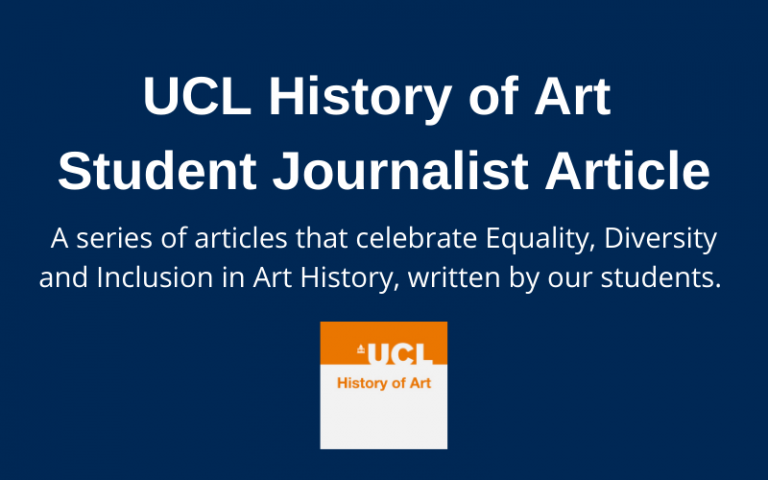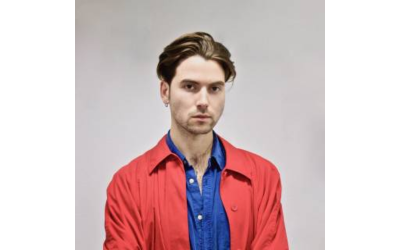“Derek Jarman Disneyland”: A Conversation with PhD Candidate Will Ballantyne-Reid
3 August 2022
As part of our commitment to Equality, Diversity and Inclusion, we have appointed three student journalists to create compelling content which links Art History and EDI. In this article, student Joseph Knoeppel speaks with UCL History of Art PhD candidate Will Ballantyne-Reid.

Despite our misleading accents, Will and I discovered shortly through our coffee meeting that we had both grown up in Scotland. We share strikingly similar experiences of schools in Edinburgh, though, unlike me, who came to art history with a bachelor’s in politics, Will had been encouraged by teachers to pursue the subject since sixth form. Determined to move to London, Will applied to study the history of art at The Courtauld, where he found himself surrounded, for the first time, by people with similar interests.
From curating shows during his undergrad to writing features for magazines, Will has taken advantage of the abundance of culture the city has to offer. Will’s interests are rooted in pop and visual cultures, and a desire to work on art of the AIDS crisis guided his early research. During one undergrad module in medieval blood theory sparked his critical engagement with the AIDS crisis and its relationship to the history of art. One recent article titled ‘The queer artist exploring masculinity with Medieval symbols’ featured in i-D magazine.
During his undergraduate studies, Will also began to think critically about British artist Derek Jarman. His undergraduate dissertation, which explored interactions of Jarman’s film Blue with psychoanalysis and themes of mourning and melancholia, was supervised by Mignon Nixon, who, coincidentally, is now part of the academic and teaching staff at UCL. In Blue, released shortly before the artist’s death, Jarman reflects on his declining health, a consequence of his AIDS diagnosis, in a narration played over the projection of a blue screen.

UCL History of Art PhD candidate, Will Ballantyne-Reid
After a year spent working at a London gallery, Will returned to The Courtauld and continued to explore how the visual arts have engaged with the AIDS crisis. Focussing on documentary photography, his master’s dissertation discussed the 1986 docufiction film Hail the New Puritan which follows a day in the life of the Scottish dancer and choreographer Michael Clark – the dancer and choreographer has collaborated with Derek Jarman and is best known for bringing punk to ballet. The film was directed by George Atlas and designed by Leigh Bowery and Will’s interest in the film’s style, docufiction, was rooted in morality, notions of the unclean, the AIDS crisis, and societal issues around the gay man.
Following an extended essay written during his master’s, Will spoke in Paris in 2017 at a graduate workshop on the multimedia American artist David Wojnarowicz and his unorthodox archive, the Magic Box. The Magic Box contains a collection of 58 items, seemingly lacking connection, that the artist kept beneath his bed while he died of complications from AIDS. Some items include a prayer card, several bead necklaces, a Buddha sculpture, an effigy of Christ on the cross, miniature globes, and an action figure. The writer Cynthia Carr, who published a biography of the artist in 2012, found only one record of the Magic Box in a journal entry dated 1988, in which the artist expressed that he wanted the ephemeral archive to be included in an exhibition. This, of course, never happened in his lifetime, but the Magic Box was included by Julie Ault in her contribution to the 2014 Biennial in which notions of afterlife were explored.
After several years working in the art industry – experience in commercial galleries, a short stint in an auction house, and later working as a freelance writer and curator – Will has returned to academia joining the UCL History of Art department to write his PhD titled: ‘Derek Jarman, Painter: Activism, Archives and Ephemera’. Will explained to me that increased access to Jarman’s paintings had prompted his decision to pursue his PhD. A lawsuit brought by Jarman's long-term partner Keith Collins against art dealer Richard Salmon.
The paintings, specifically those exhibited in the Manchester Museum of Art, engage directly with Jarman’s time at Prospect Cottage, where he moved after being diagnosed with AIDS. His paintings had previously been eclipsed by his wider legacy, specifically as a filmmaker, activist, and writer. Thus, Will’s mission is to investigate those works by Jarman that might have fallen through research gaps.
Supervised by Professor Bob Mills, Will largely means to focus on Jarman’s paintings, placing them in context with creative responses to crises, specifically the AIDS crisis of the 1980s and early 1990s Britain, the artist’s activism, and Prospect Cottage, the home (and now archive) of Jarman and his personal collection – artworks, books, and miscellaneous objects. Will reminded me that Jarman had trained as a painter, and in his later life, while suffering from AIDS-related illnesses, returned to the medium, artistically coming full circle. There exists a parallel between Wojnarowicz’s Magic Box, and Jarman’s Prospect Cottage. They exhibit a tangible response to their AIDS diagnoses; something one can see, touch, and visit.
We spoke briefly about an exhibition at Garden Museum in which Prospect Cottage, complete with its garden, was transplanted from Dungeness to Central London within the church-turned-exhibition space. To my amusement, Will described the exhibition as a “Derek Jarman Disneyland”. His recent Upgrade paper reflected upon Art Fund’s ‘Save Prospect Cottage’ campaign and its implications for Jarman’s legacy as manifested through these institutional retrospectives of his work. In a nutshell, Will is sensitive to the possibility of art history to write about queer figures within limited frameworks. Above all, Will’s research focuses on how we remember artists.
Whether contemplating hidden meanings in Wojnarowicz’s Magic Box or engaging with Jarman’s Prospect Cottage to illuminate the artist’s painterly projects, Will’s keen interest in how artist archives and the AIDS crisis interact fuel much needed research at the intersection of queer histories and art history.
Written by Joseph Knoeppel
 Close
Close

